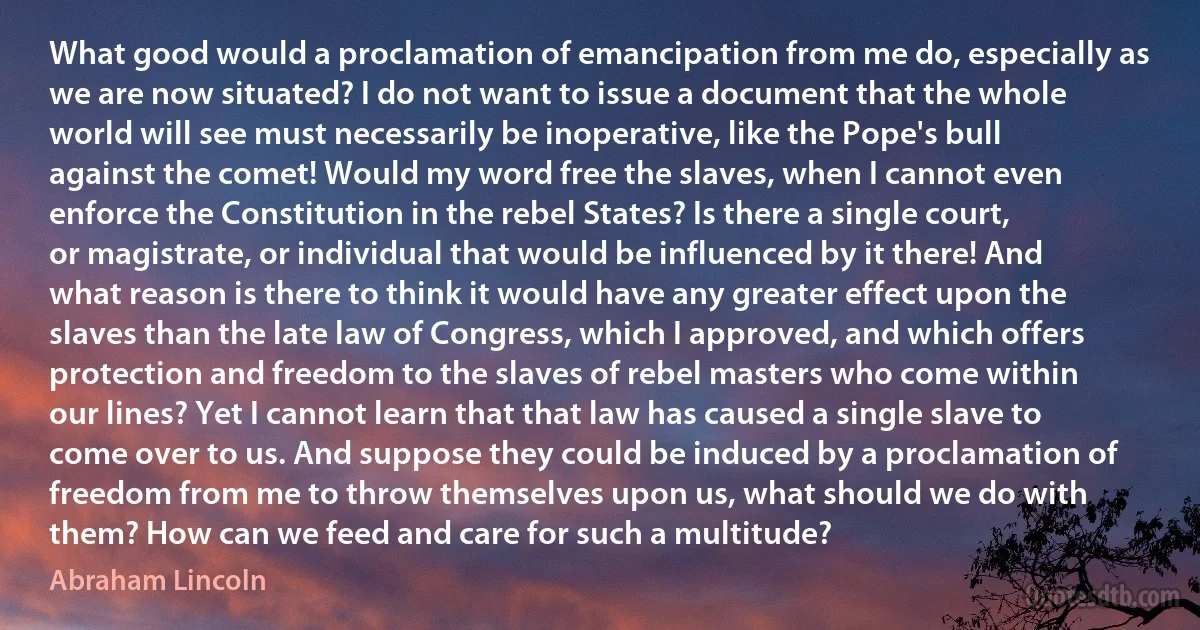
What good would a proclamation of emancipation from me do, especially as we are now situated? I do not want to issue a document that the whole world will see must necessarily be inoperative, like the Pope's bull against the comet! Would my word free the slaves, when I cannot even enforce the Constitution in the rebel States? Is there a single court, or magistrate, or individual that would be influenced by it there! And what reason is there to think it would have any greater effect upon the slaves than the late law of Congress, which I approved, and which offers protection and freedom to the slaves of rebel masters who come within our lines? Yet I cannot learn that that law has caused a single slave to come over to us. And suppose they could be induced by a proclamation of freedom from me to throw themselves upon us, what should we do with them? How can we feed and care for such a multitude?
Abraham LincolnRelated topics
bull care comet congress court document emancipation enforce feed free freedom good late law learn now proclamation reason see should single slave suppose throw word yet masters StatesRelated quotes
Poor Joshua! Victim of repeated attacks by an irresponsible, bullying, cowardly, and intemperate father, and abandoned by respondents who placed him in a dangerous predicament and who knew or learned what was going on, and yet did essentially nothing except, as the Court revealingly observes, ante, at 193, "dutifully recorded these incidents in [their] files." It is a sad commentary upon American life, and constitutional principles - so full of late of patriotic fervor and proud proclamations about "liberty and justice for all" - that this child, Joshua DeShaney, now is assigned to live out the remainder of his life profoundly retarded. Joshua and his mother, as petitioners here, deserve - but now are denied by this Court - the opportunity to have the facts of their case considered in the light of the constitutional protection that 42 U.S.C. 1983 is meant to provide."

Harry Blackmun
I reproach myself for a gross error. But I would reproach myself more if I had persisted in an error after observations revealed it clearly to be that. I made a deal of money in the late 1940s on the bull side, ignoring Satchel Paige's advice to Lot's wife, "Never look back.” Rather I would advocate Samuelson's Law: "Always look back. You may learn something from your residuals. Usually one's forecasts are not so good as one remembers them; the difference may be instructive.” The dictum "If you must forecast, forecast often,” is neither a joke nor a confession of impotence. It is a recognition of the primacy of brute fact over pretty theory. That part of the future that cannot be related to the present's past is precisely what science cannot hope to capture. Fortunately, there is plenty of work for science to do, plenty of scientific tasks not yet done.

Paul Samuelson
Were we required to characterise this age of ours by any single epithet, we should be tempted to call it, not an Heroical, Devotional, Philosophical, or Moral Age, but, above all others, the Mechanical Age. It is the Age of Machinery, in every outward and inward sense of that word; the age which, with its whole undivided might, forwards, teaches and practises the great art of adapting means to ends. Nothing is now done directly, or by hand; all is by rule and calculated contrivance. For the simplest operation, some helps and accompaniments, some cunning abbreviating process is in readiness. Our old modes of exertion are all discredited, and thrown aside. On every hand, the living artisan is driven from his workshop, to make room for a speedier, inanimate one. The shuttle drops from the fingers of the weaver, and falls into iron fingers that ply it faster.

Thomas Carlyle
They knew, however, that self-government is still government, and that the authority of the Constitution and the law is still authority. They knew that a government without power is a contradiction in terms. In order that their President and their Congress might not surpass the bounds of the authority granted to them, by the Constitution which the people had made, and so infringe upon the liberties of the people, they established a third independent department of the government, with the power to interpret and declare the Constitution and the law, the inferior courts and the Supreme Court of the United States. No President, however powerful, and no majority of Congress however large, can take from an individual, no matter how humble, that freedom and those rights which are guaranteed to him by the Constitution. The Supreme Court has final authority to determine all questions arising under the Constitution and laws of the United States.

Calvin Coolidge
It was when General Grant was fighting his way through the Wilderness to Richmond, on the 'line' he meant to pursue 'if it took all summer', and every reverse to his arms was made the occasion for a fresh demand for peace without emancipation, that President Lincoln did me the honor to invite me to the Executive Mansion for a conference on the situation. I need not say I went most gladly. The main subject on which he wished to confer with me was as to the means most desirable to be employed outside the army to induce the slaves in the rebel States to come within the Federal lines. The increasing opposition to the war, in the North, and the mad cry against it, because it was being made an abolition war, alarmed Mr. Lincoln, and made him apprehensive that a peace might be forced upon him which would leave still in slavery all who had not come within our lines.

Frederick Douglass
